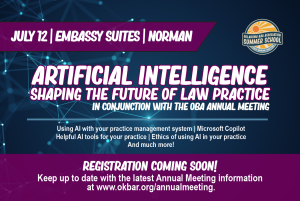Oklahoma Bar Journal
Young Lawyers Division | Embracing Innovation: The Intersection of AI, Young Lawyers and Legal Practice
By Laura R. Talbert

Paying it forward: OBA YLD members assemble bar exam survival kits containing healthy snacks and stress balls for those who sat for the February exam.
Artificial intelligence (AI) is reshaping various facets of society, and the legal domain is no exception. In the ever-evolving landscape of legal practice, today’s young lawyers are finding themselves at the intersection of traditional legal methodologies and cutting-edge technologies like AI, which presents both opportunities and challenges. As digital natives, young lawyers are well positioned to embrace AI tools and leverage them to enhance their legal practice in various ways.
One significant aspect of AI’s intersection with young lawyers and practicing law is its potential to streamline routine tasks, increase efficiency and improve access to justice. AI-powered legal research platforms can sift through vast amounts of data, analyze case law and identify relevant precedents much faster than traditional methods. This enables young lawyers to focus their time and energy on more strategic and high-value tasks, such as client counseling, negotiation and courtroom advocacy.
Furthermore, AI can serve as a valuable tool for young lawyers to improve the quality of their legal work. By leveraging AI-driven analytics and predictive modeling, young lawyers can gain insights into case outcomes, identify potential risks and develop more informed legal strategies. This data-driven approach can enhance the effectiveness of legal representation and provide clients with greater confidence in their legal counsel.
However, as with any technological innovation, the integration of AI into legal practice also presents challenges and considerations for lawyers. One such challenge is the need for ongoing education and training to effectively utilize AI tools. Young lawyers must familiarize themselves with the capabilities and limitations of AI technologies and stay updated on best practices for ethical and responsible use. The utilization of AI tools does not remove a lawyer’s responsibility of maintaining their expertise and judgment. While AI can automate routine tasks and provide valuable insights, it cannot replace the nuanced understanding of legal principles and the contextual knowledge that human lawyers bring to their practice.
 Moreover, young lawyers must navigate the ethical implications of AI in their legal practice, including concerns related to bias, privacy and transparency. While AI can be a valuable tool in their legal practices, it’s crucial to remain vigilant about the potential for bias in AI algorithms and the importance of preserving client privacy and confidentiality. As stewards of justice, lawyers have a responsibility to ensure that AI-driven decision- making aligns with both legal and ethical principles, upholding the integrity of the legal profession.
Moreover, young lawyers must navigate the ethical implications of AI in their legal practice, including concerns related to bias, privacy and transparency. While AI can be a valuable tool in their legal practices, it’s crucial to remain vigilant about the potential for bias in AI algorithms and the importance of preserving client privacy and confidentiality. As stewards of justice, lawyers have a responsibility to ensure that AI-driven decision- making aligns with both legal and ethical principles, upholding the integrity of the legal profession.
AI presents invaluable opportunities for young lawyers to enhance their legal practice, but it’s essential to emphasize that it should not be relied upon for everything. Instead, AI should be viewed as one of the many tools in a young lawyer’s toolkit. While it can certainly streamline certain tasks and provide beneficial insights, it cannot replace the nuanced comprehension that lawyers bring to their practices. As an attorney, your judgment, critical thinking and legal expertise remain indispensable components of effective legal representation. By leveraging AI as a complementary tool rather than a substitute, young lawyers can maximize the benefits while retaining control over the quality and integrity of their legal work.
OBA ETHICS COUNSEL
Through the Office of the Ethics Counsel, OBA members can obtain informal advice and interpretations of the rules of attorney conduct. The ethics counsel issues opinions to attorneys for their own guidance involving an existing set of facts. The ethics counsel issues both oral and written informal advisory opinions. Most questions can be answered over the telephone.
Richard Stevens currently serves as OBA ethics counsel. The Office of the Ethics Counsel is located at the Oklahoma Bar Center.
Contact Mr. Stevens
at 405-416-7055 or
ethicscounsel@okbar.org.
Learn more at
www.okbar.org/ec.
Ms. Talbert is a lawyer in Oklahoma City and serves as the YLD chairperson. She may be contacted at lrtalbert@gmail.com.

Paying it forward: OBA YLD members assemble bar exam survival kits containing healthy snacks and stress balls for those who sat for the February exam.


Originally published in the Oklahoma Bar Journal – OBJ 95 No. 4 (April 2024)
Statements or opinions expressed in the Oklahoma Bar Journal are those of the authors and do not necessarily reflect those of the Oklahoma Bar Association, its officers, Board of Governors, Board of Editors or staff.
